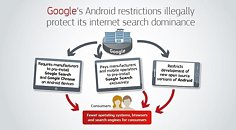Raevenlord
News Editor
- Joined
- Aug 12, 2016
- Messages
- 3,755 (1.23/day)
- Location
- Portugal
| System Name | The Ryzening |
|---|---|
| Processor | AMD Ryzen 9 5900X |
| Motherboard | MSI X570 MAG TOMAHAWK |
| Cooling | Lian Li Galahad 360mm AIO |
| Memory | 32 GB G.Skill Trident Z F4-3733 (4x 8 GB) |
| Video Card(s) | Gigabyte RTX 3070 Ti |
| Storage | Boot: Transcend MTE220S 2TB, Kintson A2000 1TB, Seagate Firewolf Pro 14 TB |
| Display(s) | Acer Nitro VG270UP (1440p 144 Hz IPS) |
| Case | Lian Li O11DX Dynamic White |
| Audio Device(s) | iFi Audio Zen DAC |
| Power Supply | Seasonic Focus+ 750 W |
| Mouse | Cooler Master Masterkeys Lite L |
| Keyboard | Cooler Master Masterkeys Lite L |
| Software | Windows 10 x64 |
It's a record-setting fine: the European Commission has officially ruled that Google must pay a fine of €4.34 billion for breaking antitrust laws, specifically related to the implementation of its services within the Android ecosystem. The three key areas within which the EC has found wrongdoings pertain to bundling of its search engine and Chrome apps into the operating system; blocking phone makers from creating devices that run forked versions of Android (claiming, without proof, that these versions would offer more security risks), and "made payments to certain large manufacturers and mobile network operators" to exclusively bundle the Google Search app on handsets.
Google now has 90 days to comply with the EC's decision (notwithstanding payment of the fine), which Google, obviously, has already announced will appeal the decision. In a statement to The Verge, a Google representative said that "Android has created more choice for everyone, not less. A vibrant ecosystem, rapid innovation, and lower prices are classic hallmarks of robust competition," and that Google "(...) will appeal the Commission's decision." The idea here seems to be to stop Google from forcing manufacturers to bundle their app and search software stacks - many times in a seemingly unremovable way. You can check the press release in the source link, but some of the more interesting snippets have been collated after the break.


View at TechPowerUp Main Site
Google now has 90 days to comply with the EC's decision (notwithstanding payment of the fine), which Google, obviously, has already announced will appeal the decision. In a statement to The Verge, a Google representative said that "Android has created more choice for everyone, not less. A vibrant ecosystem, rapid innovation, and lower prices are classic hallmarks of robust competition," and that Google "(...) will appeal the Commission's decision." The idea here seems to be to stop Google from forcing manufacturers to bundle their app and search software stacks - many times in a seemingly unremovable way. You can check the press release in the source link, but some of the more interesting snippets have been collated after the break.


Pre-installation can create a status quo bias. Users who find search and browser apps pre-installed on their devices are likely to stick to these apps. For example, the Commission has found evidence that the Google Search app is consistently used more on Android devices, where it is pre-installed, than on Windows Mobile devices, where users must download it. This also shows that users do not download competing apps in numbers that can offset the significant commercial advantage derived through pre-installation.
(...)
The Commission also assessed in detail Google's arguments that the tying of the Google Search app and Chrome browser were necessary, in particular to allow Google to monetise its investment in Android, and concluded that these arguments were not well founded. Google achieves billions of dollars in annual revenues with the Google Play Store alone, it collects a lot of data that is valuable to Google's search and advertising business from Android devices, and it would still have benefited from a significant stream of revenue from search advertising without the restrictions.
(...)
Google granted significant financial incentives to some of the largest device manufacturers as well as mobile network operators on condition that they exclusively pre-installed Google Search across their entire portfolio of Android devices. This harmed competition by significantly reducing their incentives to pre-install competing search apps.
(...)
The effects of Google's illegal practices
The Commission decision concludes that these three types of abuse form part of an overall strategy by Google to cement its dominance in general internet search, at a time when the importance of mobile internet was growing significantly.
First, Google's practices have denied rival search engines the possibility to compete on the merits. The tying practices ensured the pre-installation of Google's search engine and browser on practically all Google Android devices and the exclusivity payments strongly reduced the incentive to pre-install competing search engines. Google also obstructed the development of Android forks, which could have provided a platform for rival search engines to gain traffic. Google's strategy has also prevented rival search engines from collecting more data from smart mobile devices, including search and mobile location data, which helped Google to cement its dominance as a search engine.
Furthermore, Google's practices also harmed competition and further innovation in the wider mobile space, beyond just internet search. That's because they prevented other mobile browsers from competing effectively with the pre-installed Google Chrome browser. Finally, Google obstructed the development of Android forks, which could have provided a platform also for other app developers to thrive.
Consequences of the decision
The Commission's fine of €4 342 865 000 takes account of the duration and gravity of the infringement.
View at TechPowerUp Main Site










 Its done so someone could have money from something they never worked on.. Government theft, if you like..
Its done so someone could have money from something they never worked on.. Government theft, if you like..